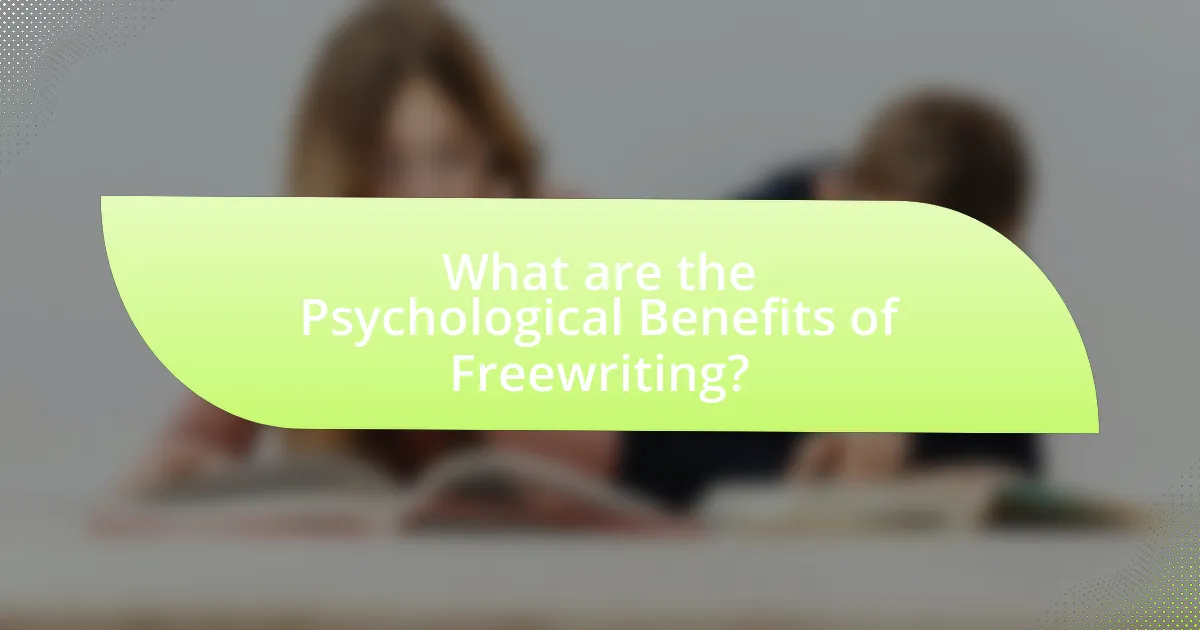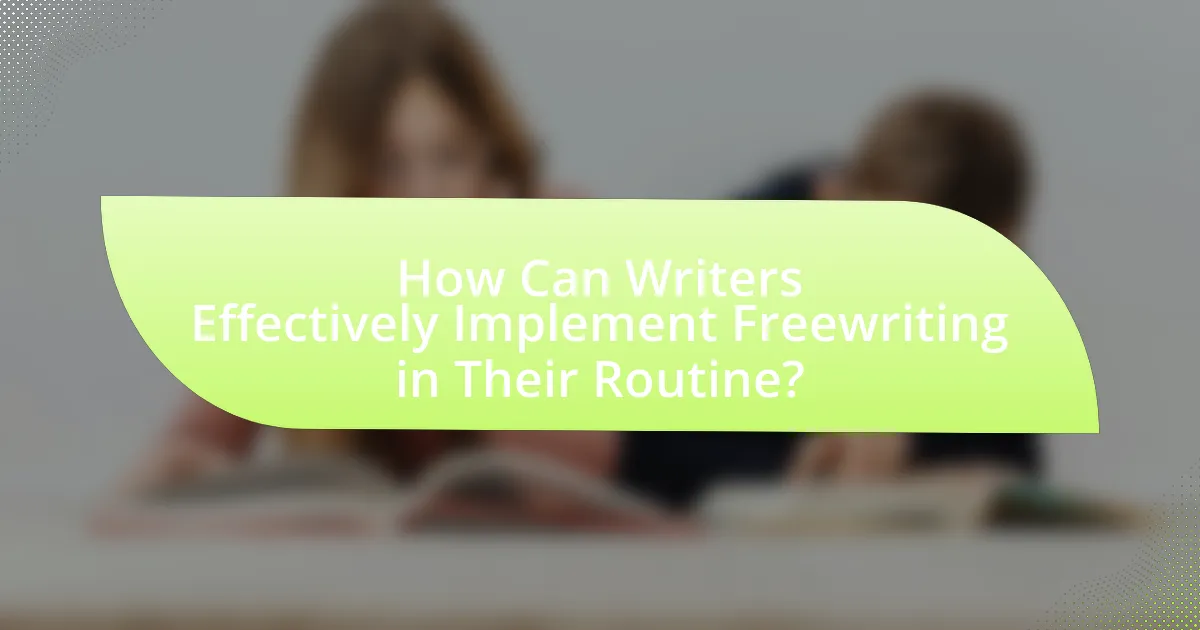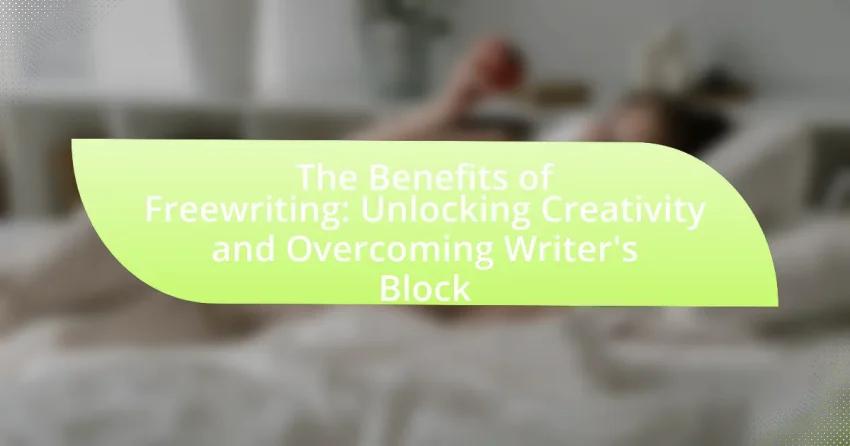Freewriting is a writing technique that allows individuals to write continuously for a set period without concern for grammar, spelling, or topic, promoting creativity and idea generation. This article explores how freewriting helps unlock creativity by reducing mental barriers, overcoming writer’s block, and enhancing cognitive processes such as divergent thinking and problem-solving abilities. It also discusses practical techniques for implementing freewriting into a writing routine, the psychological benefits associated with the practice, and strategies for maintaining focus and tracking progress. Additionally, the article highlights the resources available to support writers in their freewriting journey, emphasizing its effectiveness in fostering a positive mental state conducive to writing.

What is Freewriting and How Does It Relate to Creativity?
Freewriting is a writing technique where individuals write continuously for a set period without regard for grammar, spelling, or topic. This method encourages the free flow of thoughts, allowing writers to bypass internal criticism and access deeper creative ideas. Research indicates that freewriting can enhance creativity by reducing mental barriers and fostering a more spontaneous expression of thoughts, as evidenced by studies showing that unstructured writing exercises can lead to increased idea generation and problem-solving abilities.
How does freewriting help in unlocking creativity?
Freewriting helps in unlocking creativity by allowing individuals to express thoughts without the constraints of structure or judgment. This unfiltered writing process encourages spontaneous ideas and connections, which can lead to innovative concepts. Research indicates that freewriting activates different cognitive processes, enhancing divergent thinking, which is crucial for creativity. A study published in the journal “Thinking Skills and Creativity” found that participants who engaged in freewriting exhibited increased creative output compared to those who did not, demonstrating its effectiveness in fostering creative thinking.
What techniques are used in freewriting to enhance creative flow?
Freewriting techniques that enhance creative flow include setting a timer, writing continuously without self-editing, and focusing on a specific prompt or theme. Setting a timer, typically for 10 to 20 minutes, encourages writers to produce text without overthinking, which can lead to spontaneous ideas. Continuous writing without self-editing allows thoughts to flow freely, reducing the pressure of perfectionism and fostering creativity. Additionally, concentrating on a specific prompt or theme provides a starting point that can guide the writing process while still allowing for exploration of ideas. These techniques are supported by research indicating that freewriting can reduce anxiety and increase creative output, as demonstrated in studies on writing practices and cognitive processes.
How does the practice of freewriting differ from traditional writing methods?
Freewriting differs from traditional writing methods by emphasizing spontaneity and unfiltered expression over structured organization and editing. In freewriting, individuals write continuously for a set period without worrying about grammar, punctuation, or coherence, which contrasts with traditional methods that typically involve planning, drafting, and revising. This approach allows writers to bypass internal criticism and unlock creative thoughts, as supported by studies indicating that freewriting can enhance creativity and reduce writer’s block by fostering a more relaxed and open mindset.
What role does freewriting play in overcoming writer’s block?
Freewriting serves as a powerful tool for overcoming writer’s block by allowing writers to bypass their internal critic and generate ideas freely. This technique encourages spontaneous expression, which can lead to unexpected insights and creativity. Research indicates that freewriting can reduce anxiety associated with writing, as it shifts focus from perfectionism to the act of writing itself, thus facilitating a flow of thoughts. A study by Elbow (1998) highlights that freewriting helps writers to access their subconscious, making it easier to overcome mental barriers and stimulate the writing process.
Why do writers experience writer’s block?
Writers experience writer’s block primarily due to psychological factors such as fear of failure, perfectionism, and self-doubt. These mental barriers can inhibit creativity and the flow of ideas, making it difficult for writers to produce content. Research indicates that stress and anxiety can also contribute to this phenomenon, as they create a mental environment that is not conducive to creative thinking. For instance, a study published in the Journal of Creative Behavior found that high levels of anxiety negatively impact creative performance, leading to increased instances of writer’s block.
How can freewriting serve as a solution to writer’s block?
Freewriting serves as a solution to writer’s block by allowing writers to bypass their internal critic and generate ideas freely. This technique encourages continuous writing without concern for grammar, structure, or coherence, which can help alleviate the pressure that often contributes to writer’s block. Research indicates that freewriting can stimulate creativity and enhance cognitive flow, making it easier for writers to access their thoughts and ideas. By engaging in this practice, writers can unlock their creativity and overcome the mental barriers that hinder their writing process.

What are the Psychological Benefits of Freewriting?
Freewriting offers significant psychological benefits, including reduced anxiety and enhanced creativity. Engaging in freewriting allows individuals to express thoughts without judgment, which can alleviate stress and promote emotional release. Research indicates that this practice can lead to increased self-awareness and clarity of thought, as it encourages the exploration of subconscious ideas. A study published in the Journal of Writing Research found that participants who practiced freewriting reported higher levels of creative thinking and lower levels of writer’s block, demonstrating its effectiveness in fostering a positive mental state conducive to writing.
How does freewriting reduce anxiety and stress in writers?
Freewriting reduces anxiety and stress in writers by allowing them to express thoughts without the pressure of structure or judgment. This unfiltered writing process encourages spontaneity, which can alleviate the fear of criticism and perfectionism that often paralyzes writers. Research indicates that freewriting activates the creative brain while simultaneously reducing the stress response, as it promotes a flow state where writers can immerse themselves in their thoughts. A study published in the Journal of Writing Research found that participants who engaged in freewriting reported lower levels of anxiety and increased feelings of creative freedom, demonstrating its effectiveness in managing stress for writers.
What psychological mechanisms are involved in the freewriting process?
The psychological mechanisms involved in the freewriting process include cognitive flow, reduced inhibition, and enhanced self-expression. Cognitive flow occurs when individuals become fully immersed in the writing task, leading to increased creativity and productivity. Reduced inhibition allows writers to bypass internal critiques and fears, facilitating a more spontaneous and authentic expression of thoughts. Enhanced self-expression enables individuals to articulate their ideas and emotions freely, which can lead to greater insights and problem-solving. Research by Csikszentmihalyi (1990) on flow states supports the idea that immersion in a task can enhance creativity, while studies on expressive writing highlight the benefits of reduced inhibition and self-expression in overcoming psychological barriers.
How does freewriting contribute to emotional expression?
Freewriting contributes to emotional expression by allowing individuals to articulate their thoughts and feelings without the constraints of structure or judgment. This unfiltered writing process encourages the exploration of deep-seated emotions, facilitating self-discovery and catharsis. Research indicates that expressive writing, including freewriting, can lead to improved emotional well-being by reducing anxiety and enhancing mood, as evidenced by studies conducted by James Pennebaker, which demonstrate that writing about emotional experiences can lead to significant psychological benefits.
What cognitive benefits can be gained from freewriting?
Freewriting enhances cognitive benefits such as improved creativity, increased fluency in writing, and enhanced critical thinking skills. Engaging in freewriting allows individuals to bypass internal censorship, leading to a flow of ideas that can stimulate creative thought processes. Research indicates that this practice can increase the volume of ideas generated, as shown in a study by M. A. Elbow, which highlights how freewriting encourages spontaneous thought and reduces anxiety related to writing tasks. Additionally, freewriting can strengthen critical thinking by prompting writers to explore and articulate their thoughts without the constraints of formal structure, thereby fostering deeper engagement with their subject matter.
How does freewriting enhance critical thinking skills?
Freewriting enhances critical thinking skills by promoting the flow of ideas without the constraints of formal structure, allowing individuals to explore thoughts freely. This unstructured writing process encourages deeper reflection and the examination of various perspectives, which are essential components of critical thinking. Research indicates that freewriting can lead to improved cognitive flexibility, as it helps individuals connect disparate ideas and develop more nuanced arguments. For instance, a study published in the journal “Thinking Skills and Creativity” found that participants who engaged in freewriting demonstrated greater creativity and problem-solving abilities compared to those who did not, highlighting its effectiveness in fostering critical thinking.
What impact does freewriting have on problem-solving abilities?
Freewriting enhances problem-solving abilities by facilitating the flow of ideas and reducing mental barriers. This technique encourages individuals to express thoughts without self-censorship, which can lead to unexpected insights and solutions. Research indicates that freewriting activates different cognitive processes, promoting divergent thinking, which is essential for effective problem-solving. For instance, a study published in the journal “Thinking Skills and Creativity” found that participants who engaged in freewriting demonstrated improved creative thinking and problem-solving skills compared to those who did not. This evidence supports the notion that freewriting serves as a valuable tool for enhancing cognitive flexibility and generating innovative solutions.

How Can Writers Effectively Implement Freewriting in Their Routine?
Writers can effectively implement freewriting in their routine by setting aside dedicated time each day to write without self-editing or judgment. This practice encourages the flow of ideas and helps overcome writer’s block, as it allows writers to express thoughts freely, fostering creativity. Research by Peter Elbow, a prominent advocate of freewriting, indicates that this technique can enhance writing fluency and reduce anxiety associated with the writing process. By committing to a consistent schedule, such as 10-15 minutes daily, writers can integrate freewriting into their habits, ultimately leading to improved writing skills and greater creative output.
What are some practical tips for starting a freewriting practice?
To start a freewriting practice, set a specific time each day dedicated to writing without interruption. This consistency helps establish a routine, making it easier to engage in the practice regularly. Additionally, choose a comfortable and distraction-free environment to enhance focus and creativity. Research indicates that freewriting can significantly reduce writer’s block by allowing thoughts to flow freely, as demonstrated in studies on creative writing techniques. Finally, use a timer to write continuously for a set period, such as 10 to 20 minutes, which encourages spontaneity and reduces self-censorship.
How long should a freewriting session last for optimal results?
A freewriting session should last for 10 to 20 minutes for optimal results. Research indicates that this duration allows individuals to bypass their internal editor and access deeper creative thoughts. Studies show that shorter sessions can lead to more spontaneous and authentic writing, as they encourage a flow of ideas without the pressure of perfection.
What environment is most conducive to effective freewriting?
An environment that is most conducive to effective freewriting is one that is quiet, comfortable, and free from distractions. This setting allows writers to focus solely on their thoughts and ideas without interruptions. Research indicates that a calm atmosphere enhances cognitive function and creativity, as demonstrated in studies showing that individuals perform better in low-stimulation environments. Additionally, having a dedicated writing space can further promote a sense of routine and mental readiness, which is essential for engaging in freewriting effectively.
What common challenges do writers face when freewriting?
Writers commonly face challenges such as self-doubt, lack of focus, and fear of judgment when freewriting. Self-doubt can hinder creativity, as writers may question the value of their ideas, leading to a mental block. Lack of focus often results from distractions or an unclear direction, making it difficult to maintain a steady flow of thoughts. Additionally, fear of judgment can stifle expression, as writers may worry about how their work will be perceived by others. These challenges are well-documented in studies on writing processes, which highlight the psychological barriers that can impede freewriting effectiveness.
How can writers overcome the fear of judgment during freewriting?
Writers can overcome the fear of judgment during freewriting by adopting a mindset that prioritizes self-expression over evaluation. This approach encourages writers to focus on the act of writing itself, rather than the potential criticism of their work. Research indicates that freewriting, which involves writing continuously without concern for grammar or structure, can reduce anxiety and foster creativity. A study published in the Journal of Creative Behavior found that engaging in freewriting exercises significantly decreased self-doubt and increased creative output among participants. By embracing this practice, writers can create a safe space for their thoughts, allowing them to write freely without the constraints of judgment.
What strategies can help maintain focus during freewriting sessions?
To maintain focus during freewriting sessions, setting a timer and creating a distraction-free environment are effective strategies. Setting a timer, such as for 10 to 20 minutes, encourages sustained writing without interruptions, which helps to build momentum and concentration. A distraction-free environment, achieved by turning off notifications and finding a quiet space, minimizes external interruptions, allowing for deeper engagement with the writing process. Research indicates that structured time limits can enhance productivity and focus, as seen in studies on time management and cognitive performance.
What are the best practices for integrating freewriting into a writing routine?
To effectively integrate freewriting into a writing routine, writers should establish a consistent schedule, dedicating specific time slots for freewriting sessions. This practice encourages regular engagement with writing, fostering creativity and reducing the pressure of perfectionism. Additionally, setting a timer for 10 to 20 minutes can help maintain focus and prevent distractions, allowing thoughts to flow freely without self-editing. Creating a comfortable and distraction-free environment further enhances the effectiveness of freewriting, as it allows writers to immerse themselves fully in the process. Research indicates that freewriting can significantly reduce writer’s block and enhance creative output, as it encourages spontaneous idea generation and exploration of thoughts without judgment.
How can writers track their progress and improvements through freewriting?
Writers can track their progress and improvements through freewriting by regularly reviewing their written pieces to identify patterns, themes, and growth in their writing style. This method allows writers to observe changes in their vocabulary, sentence structure, and overall fluency over time. For instance, a study published in the Journal of Writing Research indicates that consistent practice in freewriting enhances both creativity and writing proficiency, as it encourages writers to explore their thoughts without the constraints of formal structure. By comparing earlier freewriting sessions with more recent ones, writers can concretely measure their development and recognize areas that require further attention or refinement.
What resources are available to support writers in their freewriting journey?
Writers can utilize various resources to support their freewriting journey, including online platforms, writing prompts, and community workshops. Online platforms like 750 Words and Write or Die provide structured environments that encourage daily writing habits and help track progress. Writing prompts from websites such as Writers’ Digest and The Write Practice stimulate creativity and provide direction for freewriting sessions. Additionally, community workshops and writing groups, often found through local libraries or organizations like NaNoWriMo, offer collaborative spaces where writers can share their work and receive feedback, fostering motivation and accountability. These resources collectively enhance the freewriting experience by providing tools, inspiration, and community support.
